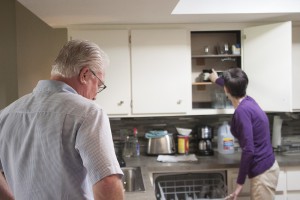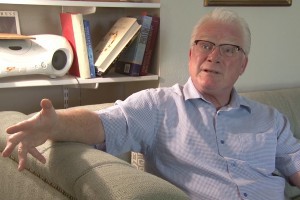TOP: One routine Ken Koch observes as caregiver to his wife, Mary, who
suffered brain damage after surgery for a tumor on her brain stem, is
unloading the dishwasher. (Photo by Ty Scholes/Cronkite News)
BOTTOM: Ken Koch says caring for his wife, who suffered brain damage after surgery for a tumor on her brain stem, has been “life-changing, overwhelming and inspiring.” (Photo by Jessi Schultz/Cronkite News)
By TY SCHOLES
Cronkite News
Hand in hand, Ken Koch walks his wife, Mary, to the dishwasher and opens it for her. She pauses and looks at the dishes, then grabs a mug and taps it on the drying towel. Into the cupboard and back again, Mary takes her time unloading.
“Routine is a big part of our day,” Ken says, looking at his wife with a patient expression.
Their relationship changed completely the day seven years ago when doctors found a lemon-sized tumor near Mary’s brain stem. She was rushed into surgery that was followed by complications that left her with severe brain damage.
Mary no longer has short-term memory; her brain resets every 20 seconds.
“It was catastrophic, and I was overwhelmed,” said Ken, a 64-year-old retiree. “I just had to live minute to minute. I was still working at this time, so I had to go back and forth. It was survival at its very core.”
His situation is increasingly common. As America’s population ages, the number of older family caregivers has grown.
Research suggests that the pressure of caring for loved ones can be especially taxing for older people. A recent study by AARP and the National Alliance for Caregiving found that 55 percent of family caregivers reported feeling overwhelmed by stress, and an accompanying news release questioned whether enough is being done to support them.
“They typically focus all their attention on their loved ones, and we try to teach them that it’s very important to find ways to take care of themselves,” said David W. Coon, an Arizona State University professor who studies chronic mental health problems associated with aging. “If they go down, it’s not just themselves going down. It’s also the person they are providing assistance to.”
Not every caregiver reacts the same way, Coon said.
“Some people experience depression, some people experience frustration or anger, others experience worry,” he said.
Scott Hawthorthwaite, director of care coordination at the Area Agency on Aging for Maricopa County, suggests that physicians educate caregivers at the time of diagnosis on the possible struggles down the road.
“We see caregivers very late in the caregiving journey call us at the point when they absolutely need a break,” he said, adding that caregivers should reach out for help before they become overwhelmed.
His agency offers services like Adult Day Health Care, which provides care and supervised activities for seniors with disabilities.
“Not only is it a break for the caregiver, but the care receiver often enjoys getting out of the house,” Hawthorthwaite said.
He said caregiver support groups are also highly beneficial to family members feeling overwhelmed and isolated. When people visit these groups, he said, they tend not to feel so alone.
“They share their experience and learn caregiver tips, and meet new friends as well,” Hawthorthwaite said.
His organization offers a 24-hour Senior Help Line at 602-264-4357 (HELP).
Ken Koch said he tried to go it alone for three years before finally seeking help through individual and group therapy. That assistance relieved his anxiety, he said, and Mary responded as well, seeming more comfortable and smiling more.
“When I started getting support and help and giving myself a break mentally and emotionally, all the sudden Mary started to improve in little subtle ways,” he said.
While his journey has been difficult, Ken also calls it “life-changing, overwhelming and inspiring.”
“I’ve learned so much about loving another human being. I’ve also learned to love myself a bit better,” he said. “I don’t have that little critic on my shoulder all the time, and I’m grateful for the small things.”
Ken’s advice for others in his situation: Get support.
“There’s a lot of us out there, more than you’d know. And there’s going to be a lot more,” he said. “The resources are not numerous, but they’re out there.”
BOTTOM: Ken Koch says caring for his wife, who suffered brain damage after surgery for a tumor on her brain stem, has been “life-changing, overwhelming and inspiring.” (Photo by Jessi Schultz/Cronkite News)
By TY SCHOLES
Cronkite News
Hand in hand, Ken Koch walks his wife, Mary, to the dishwasher and opens it for her. She pauses and looks at the dishes, then grabs a mug and taps it on the drying towel. Into the cupboard and back again, Mary takes her time unloading.
“Routine is a big part of our day,” Ken says, looking at his wife with a patient expression.
Their relationship changed completely the day seven years ago when doctors found a lemon-sized tumor near Mary’s brain stem. She was rushed into surgery that was followed by complications that left her with severe brain damage.
Mary no longer has short-term memory; her brain resets every 20 seconds.
“It was catastrophic, and I was overwhelmed,” said Ken, a 64-year-old retiree. “I just had to live minute to minute. I was still working at this time, so I had to go back and forth. It was survival at its very core.”
His situation is increasingly common. As America’s population ages, the number of older family caregivers has grown.
Research suggests that the pressure of caring for loved ones can be especially taxing for older people. A recent study by AARP and the National Alliance for Caregiving found that 55 percent of family caregivers reported feeling overwhelmed by stress, and an accompanying news release questioned whether enough is being done to support them.
“They typically focus all their attention on their loved ones, and we try to teach them that it’s very important to find ways to take care of themselves,” said David W. Coon, an Arizona State University professor who studies chronic mental health problems associated with aging. “If they go down, it’s not just themselves going down. It’s also the person they are providing assistance to.”
Not every caregiver reacts the same way, Coon said.
“Some people experience depression, some people experience frustration or anger, others experience worry,” he said.
Scott Hawthorthwaite, director of care coordination at the Area Agency on Aging for Maricopa County, suggests that physicians educate caregivers at the time of diagnosis on the possible struggles down the road.
“We see caregivers very late in the caregiving journey call us at the point when they absolutely need a break,” he said, adding that caregivers should reach out for help before they become overwhelmed.
His agency offers services like Adult Day Health Care, which provides care and supervised activities for seniors with disabilities.
“Not only is it a break for the caregiver, but the care receiver often enjoys getting out of the house,” Hawthorthwaite said.
He said caregiver support groups are also highly beneficial to family members feeling overwhelmed and isolated. When people visit these groups, he said, they tend not to feel so alone.
“They share their experience and learn caregiver tips, and meet new friends as well,” Hawthorthwaite said.
His organization offers a 24-hour Senior Help Line at 602-264-4357 (HELP).
Ken Koch said he tried to go it alone for three years before finally seeking help through individual and group therapy. That assistance relieved his anxiety, he said, and Mary responded as well, seeming more comfortable and smiling more.
“When I started getting support and help and giving myself a break mentally and emotionally, all the sudden Mary started to improve in little subtle ways,” he said.
While his journey has been difficult, Ken also calls it “life-changing, overwhelming and inspiring.”
“I’ve learned so much about loving another human being. I’ve also learned to love myself a bit better,” he said. “I don’t have that little critic on my shoulder all the time, and I’m grateful for the small things.”
Ken’s advice for others in his situation: Get support.
“There’s a lot of us out there, more than you’d know. And there’s going to be a lot more,” he said. “The resources are not numerous, but they’re out there.”










No comments:
Post a Comment